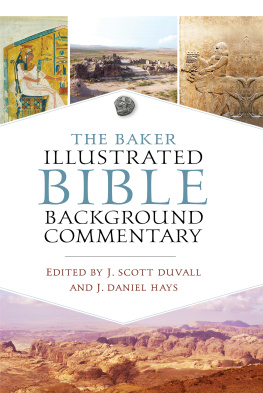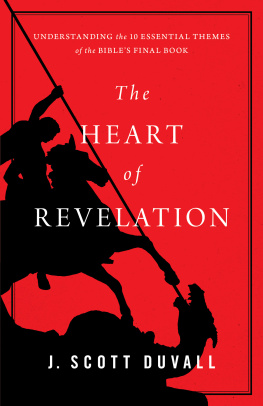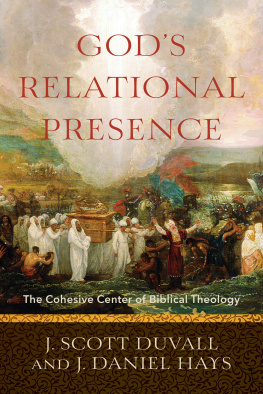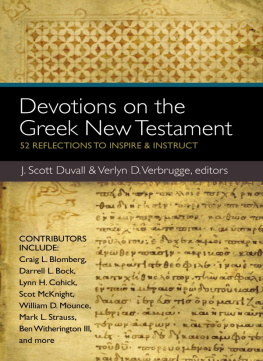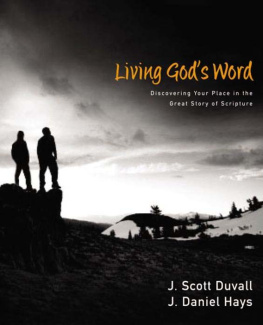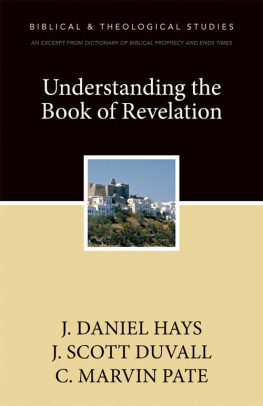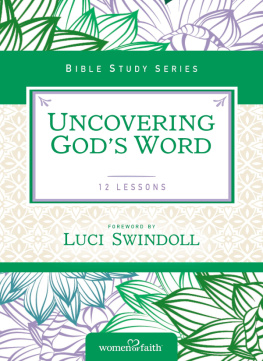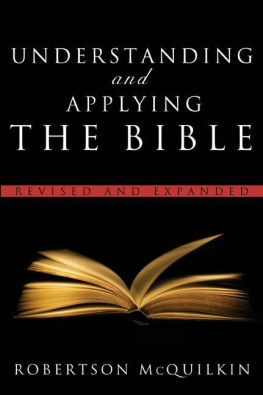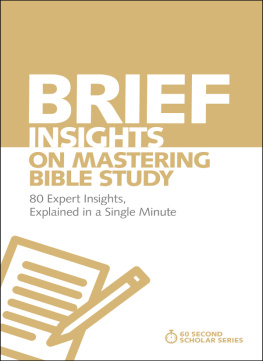THIRD EDITION
Grasping Gods Word
A Hands-On Approach to
Reading, Interpreting, and
Applying the Bible
J. Scott Duvall
J. Daniel Hays
Forewords by Mark L. Strauss
and Kevin J. Vanhoozer

To our wives, Judy Duvall and Donna Hays
Our discussion of Song of Songs () summarizes our love for you
CONTENTS
This is a wonderful user-friendly book for serious readers who desire to journey into the world of the Bible in order better to understand and to live faithfully in todays world. J. Scott Duvall and J. Daniel Hays have chosen an apt title: Grasping Gods Word. The metaphor of grasping is a useful one for thinking through what is involved in biblical interpretation. As you embark on that lifelong journey, as well as the shorter one of studying the present work, it may be useful to keep four senses of the term in mind.
To begin with, grasping is an act of violence: to seize greedily. This is not what the present authors intended! It is, however, what many so-called postmodern readers think about the process of interpretation. In our disenchanted, disbelieving age, many no longer believe that there is a meaning in texts. Interpretation is more like a power struggle in which the reader imposes or forces his or her will on the text: This is what it means to me. In the opinion of many contemporary readers, we can never see beyond ourselves so as to attain an objective meaning. For these postmodern readers, there is no such thing as correct interpretation.
Grasping Gods Word lays great emphasis on the importance of observing the small details and the overall design of biblical texts. Yet Duvall and Hays are not unaware of the current skeptical trend. They well know that the observer-reader is not an impersonal recording device, but rather a person with a specific identity, history, and cultural background all of which affect what one sees. Readers are not godlike, hovering in disembodied fashion over literary creations; no, readers, like authors, are rooted in particular historical situations in what our authors call towns.
Not wreaking violence on texts is hard work, for it is all too easy to read our own ideas and prejudices into the text. Accordingly, the authors call readers both to undertake serious observation and to be honest about their background and their location. Readers must be prepared to have their values and beliefs called into question by the text. If they are not, they will grasp the Bible in the wrong way, twisting its words so that they conform to what we want them to say. This book is about avoiding such violent grasping.
Second, Grasping Gods Word is really about another kind of grasping: understanding. We grasp an idea or a story or a poem when we can make good sense of the words in their context. For only when an interpretation makes sense of the parts and the whole can one say: Ive got it. To grasp, or understand, or get it is to recognize what an author is saying and doing in his or her text. The present book equips serious readers to get it.
What is especially valuable is the authors attention to both the parts and the whole of the Bible. They are as concerned with the Bibles words and sentences as they are with its paragraphs and books. Why? Because they rightly see that one can only understand the whole in light of the parts, and the parts in light of the whole. So we are not to grasp at the interpretative straws of word studies and proof texts. No, as the Israelites in ancient Egypt knew, straw can be used to make bricks. The bricks in this case are sentences and paragraphs that, when put together, are in turn used to make a variety of larger structures. One therefore finds chapters on word studies (the parts), as well as chapters on how to read the different kinds of wholes (e.g., the different types of literature) that make up the Bible. Indeed, the authors rightly devote almost half of the book to the practical challenges of interpreting and applying different kinds of biblical discourse.
Third, this book is about grasping in the very literal sense of hands-on and practical know-how. For this is a book for interpreters who are willing to get their hands dirty with concrete examples and practical assignments. Readers will receive the equipment, tools, and training in order to correctly handle the word of truth (2 Tim. 2:15). Everything the contemporary tourist needs to know and to take on the journey into the world of the Bible is provided herein, along with instructions on how to get back again application!
In the fourth place, this book is about grasping Gods Word in the sense of holding on firmly. It is not enough merely to grasp Gods Word intellectually to make sense of it. No, we need to grasp Gods Word practically to make use of it. To what use should the Scriptures be put? One important answer lies within the text itself: for teaching, rebuking, correcting and training in righteousness (2 Tim. 3:16). We need not only to understand but to hold on to and obey Gods Word. For the Scriptures contain the words of eternal life the words, when grasped, that enable the reader to lay hold of Jesus Christ, Gods living Word, in faith. Of course, grasping the Scriptures, or holding on to Jesus Christ in faith, is only a figure of speech. The truth of the matter is that when we grasp the message of Gods love for us, it or rather, God grasps us. This is the true end of biblical interpretation: to know as we are known.
In the final analysis, grasping Gods Word is a matter of life and death. Needy sinners, we need to let go of the cultural baggage that weighs us down and to hold firmly on to the words of Scripture for dear life. For it is only in Scripture that we come to know, and be known, by him who is the way, the truth, and the life.
Kevin J. Vanhoozer
The Bible is the most revered, respected, and celebrated book of all time. Since the first published book rolled off the Gutenberg Press over five hundred years ago (a Bible, of course!), it has been a perpetual best-seller, far surpassing sales of any other volume in human history. For Christians, the Bible is not just a best-seller, it is Gods Worda divine message to us in human language. It holds the answers to lifes toughest questions: Where did we come from? Why are we here? Is there a God? and How is this all going to end?
Yet the Bible is also a book of bizarre events and strange mysteries. Read through the Bible and youll find angels and demons, giants and dragons, seven-headed beasts rising from the sea, human-faced locusts coming out of the abyss, sea monsters with names like Leviathan and Rahab inhabiting the ocean depths, and sons of God cohabitating with the daughters of men. The whole earth is covered by a flood, killing everyone but one family who escape on a barge. Fire and brimstone rains down on cities, obliterating them, and a woman turns into a pillar of salt. The mighty river Nile turns blood red. A powerful wind rolls back the sea and an entire nation walks through on dry land. Iron ax-heads float and dead people come back to life. This is strange stuff indeed!
Also strange to our ears are the many commands given in the Bible. People are told to cut the throats of animals and offer them as sacrifices to the Lord. They are commanded not to eat certain foods, like pork and shellfish, and not to plant two different crops in the same field. They must not wear clothing made of more than one material (cotton and polyester blend?) or tattoo their bodies. They must absolutely not work on Saturday (the Sabbath) and face execution if they do! Even in the New Testament, where most Christians feel a little more at home, people are commanded to greet one another with a kiss, to wash each others feet, and to sell everything they have and give the money to the poor. Women are told not to wear pearls or gold jewelry, to cover their heads with a veil, and to keep quiet in church. Christians today obviously do not obey all of these commands but why not? Some say theyre just part of the culture of the ancient world and dont apply today. But then what about other commands in the Bible, like those forbidding homosexual behavior? Are these just cultural as well?


